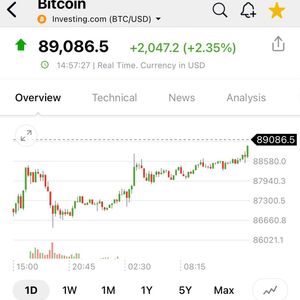The United States may be heading toward a more coordinated approach to cryptocurrency regulation, as recent developments in Washington signal potential shifts in oversight and taxation policy. On April 21, Paul Atkins was sworn in as the new chairman of the Securities and Exchange Commission, ushering in expectations of a more crypto-friendly stance at the regulatory agency. Meanwhile, a separate legislative effort is underway to end Puerto Rico’s appeal as a tax haven for crypto investors, as Representative Nydia Velázquez introduced a bill aimed at aligning the territory’s tax code with federal standards. Paul Atkins Sworn in as SEC Chairman, Ushering in a New Era for Crypto Regulation Paul Atkins has officially been sworn in as the 34th Chairman of the US Securities and Exchange Commission (SEC). The April 21 swearing-in ceremony marks Atkins’ return to the commission, having previously served as an SEC Commissioner from 2002 to 2008 under the Bush administration. Atkins' confirmation by the US Senate on April 9 in a closely divided 52-44 vote ended weeks of political anticipation and speculation, particularly around his potential impact on the regulatory environment for cryptocurrencies and blockchain-based financial products. His nomination was notably delayed due to outstanding financial disclosures , including details of significant crypto-related holdings following his marriage into a billionaire family. “I am honored by the trust and confidence President Trump and the Senate have placed in me to lead the SEC,” Atkins said during his swearing-in. “As I return to the SEC, I am pleased to join with my fellow Commissioners and the agency’s dedicated professionals to advance its mission to facilitate capital formation; maintain fair, orderly, and efficient markets; and protect investors.” “Together we will work to ensure that the US is the best and most secure place in the world to invest and do business,” he added. A Crypto-Friendly Shift Atkins’ arrival at the helm comes amid growing expectations for a more balanced and constructive relationship between the SEC and the cryptocurrency industry. Under the previous chair Gary Gensler, the commission faced widespread criticism from crypto companies, legal experts, and lawmakers for what many described as an aggressive enforcement-first approach. This approach led to numerous high-profile lawsuits, including those against Coinbase, Consensys, Gemini, and Uniswap—cases that have either been dropped or are reportedly being reconsidered under the new leadership. While Gensler defended his actions as essential to protecting investors in a fast-evolving market, critics accused his SEC of stifling innovation, ignoring calls for clear regulatory guidelines, and relying too heavily on legal action in lieu of policymaking. In stark contrast, Atkins—who has publicly supported market innovation in the past—enters the SEC with ties to the digital asset space. His financial disclosures included investments in Anchorage Digital, a regulated crypto custody platform, and Securitize, a blockchain tokenization firm that enables the digitization of real-world assets. Though questions remain about the extent of Atkins’ crypto investments and how they will be managed to avoid conflicts of interest, many in the blockchain industry view his appointment as a long-overdue reset. Atkins takes over from Acting Chair Mark Uyeda, who served as interim head following Gensler’s resignation and played a key role in beginning the agency’s pivot toward dialogue and collaboration. Uyeda established a Crypto Task Force in January 2025 aimed at improving engagement with blockchain companies, developers, and investors. Atkins is expected to continue supporting the task force while accelerating its objectives, signaling a broader shift from adversarial regulation to proactive policymaking. Industry insiders believe this could mark the start of a golden era for digital asset innovation in the US, with the SEC under Atkins potentially leading the charge in updating outdated securities laws to reflect the modern realities of blockchain finance. Avalanche of Crypto ETFs Incoming Further intensifying the crypto market’s interest in the SEC’s direction is the agency’s current backlog of over 70 cryptocurrency-related exchange-traded fund (ETF) applications awaiting review. According to Bloomberg ETF analyst Eric Balchunas, these proposals cover “everything from XRP, Litecoin and Solana to Penguins, Doge and 2x Melania and everything in between.” James Seyffart, another Bloomberg ETF analyst, previously described the situation as a “spaghetti cannon approach,” suggesting that issuers are flooding the SEC with ideas to test what the new regime might be willing to approve. The ETF race reflects not just speculative fervor but a maturing industry desperate for mainstream access to digital assets through traditional financial vehicles. A green light from the SEC on any of these funds—particularly those tied to altcoins or meme tokens—could trigger massive inflows of institutional capital. Despite his crypto-friendly leanings, Atkins still faces the monumental task of striking a balance between fostering innovation and upholding investor protections. With Congress yet to pass comprehensive crypto legislation, much of the regulatory burden continues to fall on the SEC. His leadership could also have implications beyond crypto, affecting how the commission approaches capital markets, enforcement priorities, and global competitiveness. But for now, all eyes are on his handling of the burgeoning digital asset ecosystem. Whether Atkins delivers clarity, confidence, and collaboration—or faces the same gridlock and criticism as his predecessors—will be a defining question for the SEC and for the future of crypto in America. US Lawmaker Moves to End Puerto Rico’s Crypto Tax Haven Status Meanwhile, a new piece of legislation introduced in the US House of Representatives could upend one of the most attractive tax shelters for cryptocurrency investors: the US territory of Puerto Rico. New York Representative Nydia Velázquez has put forward the Fair Taxation of Digital Assets in Puerto Rico Act, which aims to strip away key crypto-related tax incentives that have made the island a magnet for digital asset millionaires. According to an April 21 Bloomberg report, Velázquez’s bill proposes to amend Puerto Rico’s Internal Revenue Code, effectively requiring certain investors — particularly those profiting from cryptocurrency gains — to pay federal taxes on capital gains, aligning the territory more closely with the mainland US tax regime. “This wave of crypto investors hasn’t helped Puerto Rico’s recovery or strengthened the local economy,” said Velázquez. “Instead, it’s driven up housing costs, pushed out local residents, and added pressure to an island where nearly 40% of people live in poverty — all while costing the federal government billions in lost tax revenue.” Puerto Rico has long served as a legal tax haven for wealthy individuals and investors, especially those involved in cryptocurrencies. Since 2012, the territory has offered generous tax breaks through Acts 20 and 22, which were later consolidated into Act 60 under the Puerto Rico Tax Incentives Code. These laws enable qualifying residents to avoid paying capital gains taxes on income earned after relocating to the island — including profits from digital assets like Bitcoin, Ethereum, and NFTs. The island’s favorable treatment of crypto wealth has attracted a number of high-profile industry names, including Pantera Capital founder Dan Morehead, crypto venture capitalist Brock Pierce, and online influencer Logan Paul . Many investors have relocated to Puerto Rico not only for the tropical lifestyle, but also to legally shield millions — or even billions — in crypto profits from mainland US taxes. However, Velázquez’s bill represents a growing political backlash against what critics call ”crypto colonialism” — the notion that wealthy mainland Americans are exploiting Puerto Rico’s tax code while contributing little to its economic revitalization. The proposed legislation seeks to bring tax parity and restore local control over who truly benefits from the island’s incentives. Billions at Stake According to Rep. Velázquez’s office, Puerto Rico could lose as much as $4.5 billion in potential tax revenue between 2020 and 2026 due to the current structure of tax exemptions under Act 60. These losses, critics argue, come at a time when the territory remains deeply burdened by public debt, systemic poverty, and inadequate infrastructure, much of which worsened after Hurricanes Maria and Fiona. In contrast, Puerto Rico’s current governor, Jenniffer González-Colón, has advocated for extending Act 60’s provisions beyond their current expiration in 2035 to 2055, while imposing a 4% capital gains tax on new applicants — a rate still far below the up-to-37% capital gains tax faced by residents in the mainland United States. The governor’s proposal attempts to balance attracting wealthy investors with generating a modest stream of tax revenue. Velázquez’s bill, however, would essentially override the local government's authority on the issue by tying Puerto Rico’s tax treatment of crypto directly to federal law. While the Fair Taxation of Digital Assets in Puerto Rico Act is being lauded by some as a step toward equity and financial accountability, its path through Congress remains uncertain. The legislation will need to navigate a Republican-controlled House and a narrowly divided Senate, where bipartisan cooperation on tax reform has proven difficult. Moreover, the bill enters an already packed legislative calendar. Both chambers are expected to take up votes on stablecoin regulation and a comprehensive crypto oversight framework in the coming months — two hot-button topics that could dominate political bandwidth for the remainder of the year. Crypto advocates are already preparing to lobby against the bill, warning that changing Puerto Rico’s tax laws could destabilize investment flows and discourage US innovation in blockchain technology. Growing Calls for Reform Despite the uncertain legislative future, the bill reflects a growing consensus among some lawmakers that the crypto industry’s free ride may be coming to an end — especially in territories where the social costs of wealth migration are becoming more visible. Beyond Puerto Rico, several states and international jurisdictions are also re-evaluating their crypto taxation frameworks, hoping to strike a balance between attracting capital and avoiding economic inequality. Velázquez, a Democrat and longtime advocate for Puerto Rican autonomy and economic justice, has positioned her bill as part of a broader effort to ensure that the territory's economic policies serve its 3.2 million residents, rather than a small group of ultra-wealthy expats. Whether the bill can muster enough support in a divided Congress remains to be seen — but its introduction alone has reignited debate over crypto’s role in shaping modern tax policy and economic inequality in US territories.



















